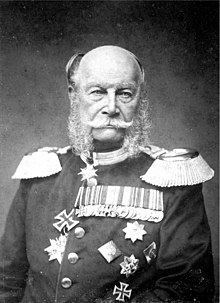Emperor Wilhelm I
| Wilhelm I | |
|---|---|

Portrait of Wilhelm I in 1884
|
|
| King of Prussia | |
| Reign | 2 January 1861 – 9 March 1888 |
| Coronation | 18 October 1861 |
| Predecessor | Frederick William IV |
| Successor | Frederick III |
| Prime Ministers | |
| Holder of the Bundespräsidium of the North German Confederation | |
| In office | 1 July 1867 – 31 December 1870 |
| Chancellor | Otto von Bismarck |
| German Emperor | |
| Reign | 1 January 1871 – 9 March 1888 |
| Coronation | 18 January 1871, Versailles |
| Successor | Frederick III |
| Chancellor | Otto von Bismarck |
| Born | 22 March 1797 Berlin, Prussia |
| Died | 9 March 1888 (aged 90) Berlin, German Empire |
| Burial | Charlottenburg Palace, Berlin, Germany |
| Spouse | Augusta of Saxe-Weimar |
| Issue |
Frederick III, German Emperor Louise, Grand Duchess of Baden |
| House | Hohenzollern |
| Father | Frederick William III of Prussia |
| Mother | Louise of Mecklenburg-Strelitz |
| Religion | Lutheranism (Prussian United) |
| Signature |  |
William I, or in German Wilhelm I. (full name: William Frederick Louis of Hohenzollern, German: Wilhelm Friedrich Ludwig von Hohenzollern, 22 March 1797 – 9 March 1888), of the House of Hohenzollern was King of Prussia from 2 January 1861 and the first German Emperor from 1 January 1871 to his death, the first Head of State of a united Germany. Under the leadership of William and his Minister President Otto von Bismarck, Prussia achieved the unification of Germany and the establishment of the German Empire. Despite his long support of Bismarck as Minister President, William held strong reservations about some of Bismarck's more reactionary policies, including his anti-Catholicism and tough handling of subordinates. Contrary to the domineering Bismarck, William was described as polite, gentlemanly and, while a staunch conservative, more open to certain classical liberal ideas than his grandson Wilhelm II.
The future king and emperor was born William Frederick Louis of Prussia (Wilhelm Friedrich Ludwig von Preußen) in the Kronprinzenpalais in Berlin on 22 March 1797. As the second son of Louise of Mecklenburg-Strelitz and Prince Frederick William, himself son of King Frederick William II, William was not expected to ascend to the throne. His grandfather died the year he was born, at age 53, in 1797, and his father Frederick William III became king. He was educated from 1801 to 1809 by Johann Friedrich Gottlieb Delbrück, who was also in charge of the education of William's brother, the Crown Prince Frederick William. At age twelve, his father appointed him an officer in the Prussian army.
...
Wikipedia
